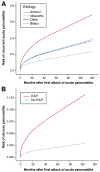Genetic risk factors for pancreatic disorders
- PMID: 23622139
- PMCID: PMC3684061
- DOI: 10.1053/j.gastro.2013.01.069
Genetic risk factors for pancreatic disorders
Abstract
A combination of genetic, environmental, and metabolic factors contribute to the development and recurrence of acute and chronic pancreatitis; information on all of these is required to manage patients effectively. For example, variants that affect regulation of the protease, serine (PRSS)1-PRSS2, and claudin (CLDN)2 loci, rather than their coding sequences, interact with other genetic and environmental factors to affect disease development. New strategies are needed to use these data and determine their contribution to pathogenesis, because these variants differ from previously studied, rare variants in exons (coding regions) of genes such as PRSS1, SPINK1, cystic fibrosis transmembrane conductance regulator (CFTR), chymotrypsin (CTR)C, and calcium-sensing receptor (CASR). Learning how various genetic factors affect pancreatic cells and systems could lead to etiology-based therapies rather than treatment of symptoms.
Copyright © 2013 AGA Institute. Published by Elsevier Inc. All rights reserved.
Figures




References
-
- Gorry MC, Gabbaizedeh D, Furey W, et al. Mutations in the cationic trypsinogen gene are associated with recurrent acute and chronic pancreatitis. Gastroenterology. 1997;113:1063–8. - PubMed
-
- Whitcomb DC, Gorry MC, Preston RA, et al. Hereditary pancreatitis is caused by a mutation in the cationic trypsinogen gene. Nature Genetics. 1996;14:141–5. - PubMed
-
- Witt H, Apte MV, Keim V, et al. Chronic pancreatitis: challenges and advances in pathogenesis, genetics, diagnosis, and therapy. Gastroenterology. 2007;132:1557–73. - PubMed
-
- Chen JM, Ferec C. Chronic pancreatitis: genetics and pathogenesis. Annu Rev Genomics Hum Genet. 2009;10:63–87. - PubMed
Publication types
MeSH terms
Grants and funding
LinkOut - more resources
Full Text Sources
Other Literature Sources
Medical
Molecular Biology Databases

